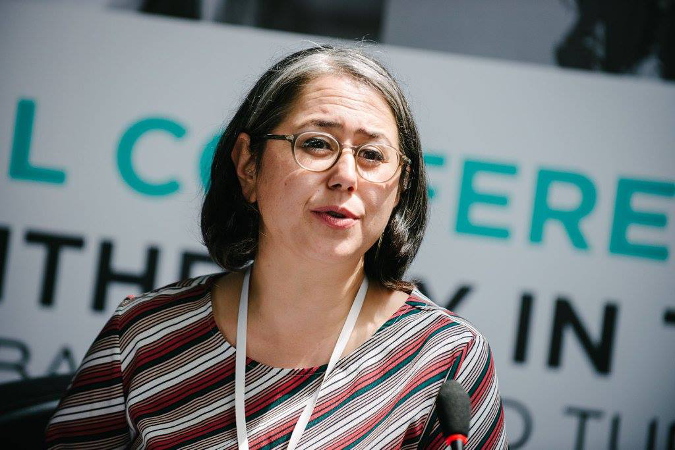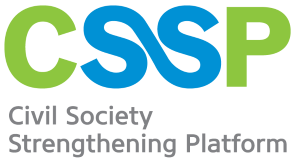Take Five: Women’s organizations pave the way for CSOs in Turkey

Photo: Courtesy of TACSO.
Ayça Bulut Bican, Resident Advisor of TACSO Turkey, at a CSO capacity building conference.
Ayça Bulut Bican is the Resident Adviser for the EU-funded Technical Assistance for Civil Society Organizations (TACSO) project in Turkey.
“Story Courtesy of the Regional Programme “Implementing Norms, Changing Minds” Ending Violence against women in the Western Balkans and Turkey, implemented by UN Women with financial assistance of the European Union.”
She is an expert in civil society development and has worked on a number of projects focused on gender equality and women’s representation in politics. She also has extensive experience working with the women’s rights movement in Turkey, supporting networks to increase their impact in policy dialogue and providing assistance to civil society organizations (CSOs).
Over the last decade, your organization has worked with CSOs in Turkey. How would you describe their current situation?
Overall, civil society in Turkey has been very diverse and vibrant over the last decade. In the last five years, the civil society environment has been enriched by citizens’ movements, platforms, networks and ad hoc coalitions, including organized and institutionalized CSOs. According to official statistics there are over 100,000 registered CSOs, and numbers are rising each year. However, CSOs and the legal and fiscal environment in which they operate have been greatly affected by the challenging political environment in Turkey. The declaration of state of emergency in August 2016 is recognized as a turning point for the civil society environment. Since then, over a thousand CSOs have been closed down, a number of CSO activities have been suspended and there has been an increase in the number of legal proceedings against human rights defenders. The World Alliance for Citizen Participation (CIVICUS) and other international actors report a trend on shrinking space for civil society in Turkey.
What kind of challenges remain for CSOs in Turkey?
TACSO has helped to identify the structural issues for CSOs in Turkey. Our Country Needs Assessment Reports reveal persistent challenges for CSOs, including the absence of an overall strategy and public policy for improving the legal and fiscal enabling environment for civil society – which would ensure the protection of civil space and foster a diversity of civil society actors. Such public policy should be developed through a participatory and holistic approach, and needs to be adopted by each level of public administration. Such a framework is essential: to encourage citizens to organize themselves in CSOs, to provide CSOs access to the necessary resources, to widen CSO outreach and, most importantly, to secure their place in policy dialogue by opening and sustaining channels, and allocating resources for CSO participation. Without an overarching public policy and its consistent implementation, CSO activities will remain ineffective and short-lived. These activities include advocating for citizens’ rights, ensuring citizens’ voices are heard in policy dialogue and holding public administrations accountable to citizens – all of which help to support the development of a democratic society and improve the quality of life.
What do you consider are the key priorities for strengthening CSOs in Turkey?
Over the past decade, the legal and fiscal environment in Turkey has restricted the livelihoods of CSOs and pushed them towards a more donor-driven approach. Many CSOs are struggling to survive on already limited resources, generally provided in the form of project based grants to work towards their missions. Other options include making use of membership fees (which can be rarely collected), limiting the scope of work and relying on individuals to sustain their existence. As the main donor for CSOs in Turkey, the European Union has developed innovative tools and programmes for supporting these organizations. However, the only viable solution for sustaining a strong and diverse civil society in the long term is to improve the enabling environment by developing an overarching strategy and policy that safeguards the independence of CSOs and protects civil space from interference.
What are the main challenges for CSOs working on the elimination of violence against women and girls (VAWG)?
The main challenges in Turkey include: the shrinking space for CSOs in policy dialogue and decision-making processes, which undermines their impact on policies and implementation; the limited availability of resources; and the legal limitations on collecting donations, tax exemptions and fundraising activities. As a result, CSOs often spend a great deal of time and energy struggling to survive as organizations rather than working towards their mission. Ensuring protection of women’s human rights defenders and recognition of their contribution to gender equality in Turkey is another challenge to overcome, which is of utmost importance.
In your opinion, how can CSOs contribute to eliminating VAWG in Turkey?
The women’s rights movement in Turkey has always been the leading group for CSOs, with their wide portfolio of cooperation modalities, their successful advocacy campaigns, and their joint and individual efforts to tackle the most pressing issues in Turkey – including VAWG, gender equality, social justice, and other forms of gender-based violence and discrimination. At TACSO Turkey[1] we have worked extensively with both national and local women’s CSOs. Through workshops, conferences, trainings and the provision of technical assistance, we aim to meet the organizational development needs of CSOs, and support their efforts to participate in policy dialogue and their work to create regional and EU-level cooperation and alliances. TACSO and other similar initiatives have also benefited from the women’s movement: particularly from its experiences, models of good practice, achievements, campaigns for policy dialogue and – last but not least – its rich portfolio of expertise.
The experience and expertise of the women’s movement in combating VAWG is an important resource for improving public policy and public services, in line with international standards. With an improvement in the overall policy environment – towards a more participatory democracy – and the realization of efforts to improve the CSO enabling environment, the women’s rights movement will continue to play a leading role in combating VAWG in Turkey. It will also continue to inspire CSOs, ensuring their place in policy dialogue and implementation – helping them in their efforts to overcome social challenges and work in the public interest.
Photo: Courtesy of TACSO.
Ayça Bulut Bican, Resident Advisor of TACSO Turkey, at a CSO capacity building conference.
